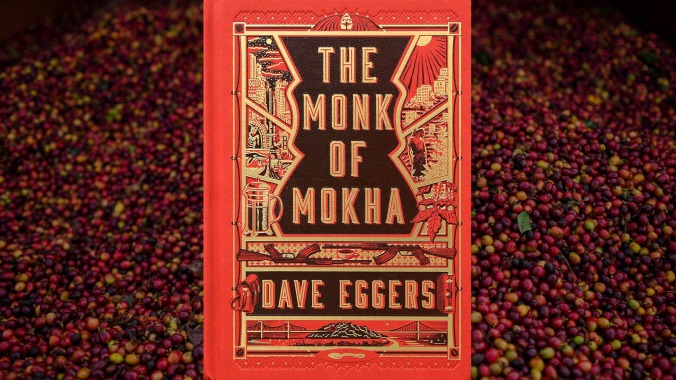Dave Eggers brews a weak cup of coffee and aspiration in his latest nonfiction The Monk Of Mokha
Aux Features Book Review
Mokhtar Alkhanshali wasn’t a coffee drinker. He didn’t know a Chemex from a Keurig. He couldn’t distinguish a coffee plant from an olive tree. He hadn’t realized that his ancestral homeland of Yemen basically originated the art of coffee. But that didn’t stop him, a 25-year-old college dropout, from endeavoring to resurrect Yemeni coffee, long dismissed as the most inferior beans in the world.
In The Monk Of Mokha, Dave Eggers tells Mokhtar’s true-life tale of starting from the bottom: surviving the childhood dregs of San Francisco’s Tenderloin district to sipping the lux life in a sky-high apartment overlooking the Bay. In between, he absorbs everything there is to know about coffee. As Mokhtar advances to become the first Arab to earn his Q-grader certification, making him a master sommelier of coffee, Eggers weaves the saga of java into his story. Five-hundred years before the proliferation of third-wave coffee houses offered shelter from a world smothered in Starbucks, Ali Ibn Umar al-Shadhili, a Sufi mystic and the book’s titular Monk, brewed history’s first cup in the port city of Mokha (hence mocha).
Mokhtar travels back to Yemen, despite a labyrinthine civil war involving Houthi rebels, Al-Qaeda in the Arabian Peninsula jihadists, ISIS suicide bombers, Saudi airstrikes, U.S. drone assassinations, and a local government with near zero capacity to feed its people, much less aid a fledgling coffee exporter. Dodging bullets, bombs, and checkpoints, he treks to remote corners of the country, hoping to locate the agrarian offspring of the monk of Mokha. He’s also kidnapped, twice, and, in a sequence of events destined for cineplexes (perhaps starring Riz Ahmed?), speedboats across the Red Sea to Djibouti alongside a pair of child refugees. Mokhtar eventually discovers some coffee plants—a few promising, many more discouraging, and most long evaporated into dust. “My grandfather’s grandfather grew coffee,” one farmer tells him. “You’re about a hundred years too late.”
For Eggers fans, The Monk Of Mokha echoes his 2012 novel, A Hologram For The King, with its Kafkaesque pitfalls of an American doing business in the Middle East. Even more, the book operates as a thematic sequel of sorts to Zeitoun (2009), a non-fiction exploration of the intersection between two George W. Bush-era disasters: Hurricane Katrina and the War On Terror. (Unfortunately, that book has become all but unreadable after it was revealed that Abdulrahman Zeitoun, a Syrian-American housepainter, plotted to murder his wife and two others). Like Zeitoun, Eggers’ latest is a politically timely tale featuring the do-or-die exploits of an unlikely but uplifting hero. But where New Orleans was so elegantly portrayed in Zeitoun, Yemen feels far-flung and foreign, absent a sense of place.
This is most evident in the book’s brief prologue, where Eggers writes of retracing Mokhtar’s steps from Costa Rica to Ethiopia, Yemen, and Djibouti. But the author’s experiences—no doubt enlightening—never percolate into Mokhtar’s story. Eggers never allows the reader the euphoria of walking through ancient coffee terraces with a cheekful of qat, the heartbreak of Djibouti’s refugee camps, the poignancy of sharing cupfuls of coffee and tea with Yemenis worn weary with war. In one of the book’s most memorable passages, Mokhtar shares stories of his travels with a group of Yemeni women. “[He] unfolded his laptop and showed them pictures of his journeys across Yemen,” Eggers writes. “They huddled close, disbelieving. They had no idea how diverse Yemen was, how beautiful.” Though Eggers takes us to a country we’ll likely never visit, he never lets that beauty shine through, leaving the reader thirsting for less rollercoaster thrills and more of his own narrative skills.
In the end, Mokhtar gets his beans to America: 14 tons ready for roasting—the first coffee exported from Mokha in 80 years. In June 2016, the Bay Area’s Blue Bottle Coffee began selling Mokhtar’s Port Of Mokha brand pour-overs for $16 a serving. Unless you’re an Eggers superfan, skip the book and splurge for a cup.
Purchasing The Monk Of Mokha via Amazon helps support The A.V. Club.